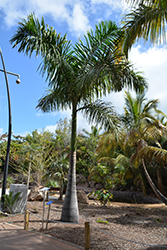It's all about ...
plants

Height: 65 feet
Spread: 20 feet
Sunlight:
![]()
Hardiness Zone: 10a
Other Names: Morass Cabbage Palm, Marsh Cabbage Palm
Description:
A magnificent palm with a tall column-like trunk topped with a superb green crownshaft, supporting attractive, arching, feather-like green leaves; a wonderful vertical accent tree in warm climate landscapes
Ornamental Features
Morass Royal Palm has attractive dark green evergreen foliage on a tree with the bulk of the canopy held atop a towering trunk or stem. The large narrow pinnately compound leaves are highly ornamental and remain dark green throughout the winter. It has masses of beautiful panicles of creamy white flowers hanging below the branches from late winter to early spring, which are most effective when planted in groupings. However, the fruit can be messy in the landscape and may require occasional clean-up. The smooth gray bark is extremely showy and adds significant winter interest.
Landscape Attributes
Morass Royal Palm is an open evergreen tree with a strong central leader and a towering form, with a high canopy of foliage concentrated at the top of the plant. Its average texture blends into the landscape, but can be balanced by one or two finer or coarser trees or shrubs for an effective composition.
This is a relatively low maintenance tree, and usually looks its best without pruning, although it will tolerate pruning. It is a good choice for attracting birds to your yard. It has no significant negative characteristics.
Morass Royal Palm is recommended for the following landscape applications;
- Accent
- Vertical Accent
- Bog Gardens
Planting & Growing
Morass Royal Palm will grow to be about 65 feet tall at maturity, with a spread of 20 feet. It has a high canopy of foliage that sits well above the ground, and should not be planted underneath power lines. As it matures, the lower branches of this tree can be strategically removed to create a high enough canopy to support unobstructed human traffic underneath. It grows at a medium rate, and under ideal conditions can be expected to live to a ripe old age of 150 years or more; think of this as a heritage tree for future generations!
This tree should only be grown in full sunlight. It prefers to grow in moist to wet soil, and will even tolerate some standing water. This plant should not require much in the way of fertilizing once established, although it may appreciate a shot of general-purpose fertilizer from time to time early in the growing season. It is not particular as to soil pH, but grows best in rich soils, and is able to handle environmental salt. It is highly tolerant of urban pollution and will even thrive in inner city environments. This species is not originally from North America.
This plant is not reliably hardy in our region, and certain restrictions may apply; contact the store for more information.
